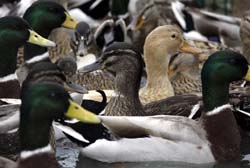EU agriculture ministers seek ways to stop bird flu
The European Union's agriculture ministers met Monday to discuss ways to combat bird flu, such as vaccinating poultry as the lethal H5N1 strain spread to a half-dozen EU nations. France, the EU's largest poultry producer, became the latest EU country to confirm H5N1 in wild fowl. Birds in Austria, Germany, Greece, Italy and Slovenia also have tested positive for the strain. Hungary also has reported five cases of suspected H5N1 and has sent samples to an EU reference laboratory for testing.

France has said it will vaccinate some 900,000 birds but there is no specific vaccine to prevent H5N1, only generic flu drugs. Germany, meanwhile, deployed 250 troops to help clear away dead birds from Ruegen, an island in the Baltic Sea where 81 dead birds, mostly swans, have tested positive for H5N1.
Last week, EU governments imposed an EU-wide order to apply a 10-kilometer (6.5-mile) quarantine and surveillance zone around suspected or confirmed outbreaks of bird flu and a wider buffer zone to keep the virus from spreading.
On Monday, agriculture ministers discussed further measures, such as vaccinations. However, EU financial aid is not available for vaccinating poultry as a preventive measure. Countries only qualify for EU aid after bird flu is found in commercial stocks and those stocks are killed, officials said.
EU officials also discussed the economic impact of bird flu and debated whether the EU should provide financial or other relief to businesses affected by the falling poultry prices.
Officials have reassured the public that eating cooked poultry remains safe. In France, where a wild duck has tested positive for H5N1, French Health Minister Xavier Bertrand urged consumers to keep eating poultry, and foie gras. "No farms on our territory are affected" by bird flu, he said on LCI television.
But farmers said consumption has fallen, causing hundreds of millions of euros (dollars) in losses. France's chief farmers' union demanded that the government free up funds to support poultry producers' efforts to prevent and fight the flu.
Elsewhere in Europe, bird flu has been confirmed recently in Azerbaijan, Bulgaria, Croatia, Romania, Russia, Turkey and Ukraine, with Bulgaria announcing Monday that H5N1 was confirmed in three more swans found dead in Bulgaria.
The EU extended restrictions on imports of poultry and bird products from Bulgaria. A regional ban also will apply for imports of poultry meat, eggs and products from wild fowl.
Two dead swans found in central Bosnia have tested positive for an H5 strain of bird flu, and samples were sent to the laboratory in Britain to determine the exact strain, the country's Veterinarian Institute said Monday.
The Netherlands, which had a bird flu outbreak in 2003 that sickened dozens of people and killed one person, ordered millions of chickens, ducks and turkeys kept indoors to reduce the risk of being infected by migrating birds.
Ninety-one people have died from bird flu, mostly in Asia, since 2003, according to the World Health Organization. Direct contact with infected poultry or surfaces contaminated by their feces is the main way humans are infected by the virus, WHO said, reports the AP.
N.U.
Subscribe to Pravda.Ru Telegram channel, Facebook, RSS!


